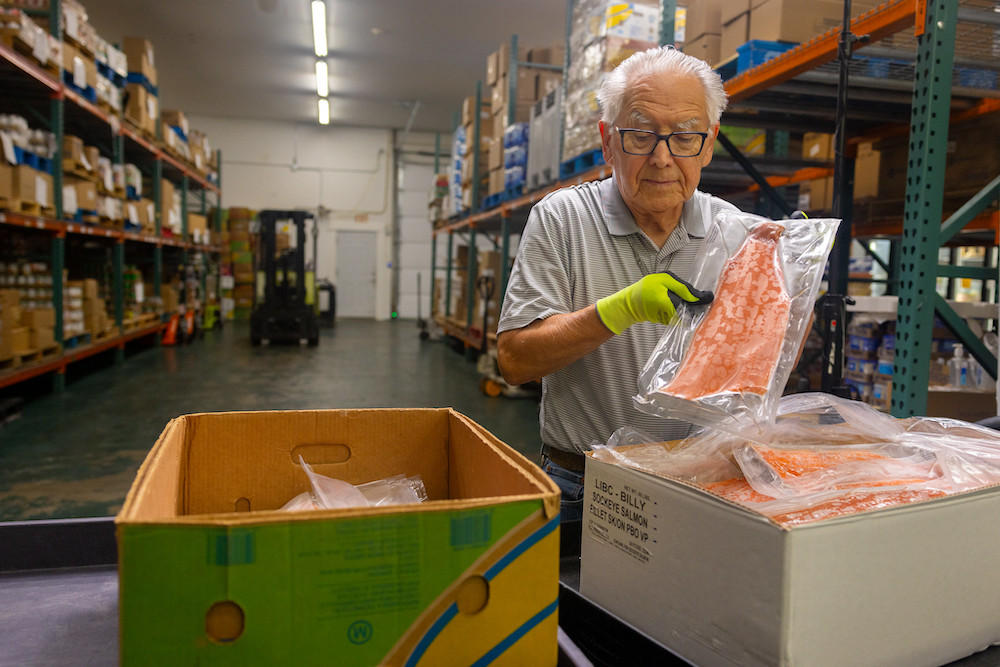
- Details
- By Chez Oxendine, Tribal Business News
U.S. Reps. Sharice Davids (D-Kan.) and Frank Lucas (R-Okla.) plan to introduce bipartisan legislation today to permanently expand tribal control over a program that provides food assistance to nearly 650,000 tribal members.
The Food Distribution Program on Indian Reservations (FDPIR) Act of 2025 would end the temporary status of an $11.4 million pilot program that has allowed 16 tribes to choose their own food suppliers since 2018. The current five-year authorization expires soon, creating uncertainty for tribal producers trying to scale their operations.
Tribal leaders and agricultural advocates have expressed concerns that the temporary nature of the program limits its ability to support long-term food security and economic development, according to a statement from Davids, an enrolled member of the Ho-Chunk Nation.
“For many Native families, accessing healthy, affordable food isn’t as simple as driving to the nearest grocery store,” Davids said in a statement. “Tribal communities face unique barriers, including long distances to grocery stores and supply chain disruptions.”
Participating tribes say the pilot program has been successful. Red Lake Band of Chippewa Indians operates a commercial fishery, wild rice cultivation and buffalo ranch that have supplied food packages to tribal members, and could do so indefinitely under permanent tribal control. The Choctaw Nation and other participating tribes have built regional food economies that support local producers.
“Tribes have shown time and time again that tribally administered programs are more efficient and effective, and this bipartisan bill is an important step towards food sovereignty,” Native Farm Bill Coalition Co-Chairs Cole Miller (Shakopee Mdewakanton Sioux Community) and Kari Jo Lawrence (Hidatsa) said in a statement.
Making the program permanent would address two key issues: supply chain reliability and tribal economic development. Under current federal management, the U.S. Department of Agriculture purchases and ships food to tribal agencies, which then distribute it to eligible families. Tribes want to direct procurement authority to source locally produced and culturally relevant foods.
“Tribes should be able to self-contract to administer quality, domestically produced food,” Lucas said in a statement. “The tribes have proven that they are willing and able to successfully administer this program.”
The pilot projects, often called “638 projects” after a section of the Indian Self-Determination and Education Assistance Act, serve as an alternative to the USDA’s Supplemental Nutrition Assistance Program (SNAP) for tribal members living on reservations.
Each month, participating households receive food packages that contain fruits, vegetables, grains, dairy, protein sources, and cooking essentials. Allowing tribes to source locally produced and culturally relevant foods for these packages has become a central platform for Native American agricultural advocates.
The 638 projects remain a major part of the Native Farm Bill Coalition’s requests for an updated Farm Bill, as well as their appeals to USDA Secretary Brooke Rollins.
Beyond providing traditional foods, giving tribes more control over food package sourcing would address shortage and delivery problems still affecting the program after a botched warehouse consolidation in early 2024.
“By permanently authorizing the program, this legislation addresses these issues by empowering tribes to manage their food procurement directly, enhancing program reliability and responsiveness,” Davids said.
The pilot program has created economic and health benefits for participating tribes. Choctaw Nation Chief Gary Batton said making the program permanent would help “allocate resources where they are most needed to build strong economies and improve the overall health of people in our communities.”
W. Ron Allen, tribal chair and CEO for the Jamestown S’Klallam Tribe, called the legislation a “vital step forward” in supporting tribal economic benefits and Native health.
“The expansion beyond procurement to the full administration of the program is long overdue and will empower more tribes to feed their people with dignity and self-determination,” Allen said.
Help us defend tribal sovereignty.
At Native News Online, our mission is rooted in telling the stories that strengthen sovereignty and uplift Indigenous voices — not just at year’s end, but every single day.
Because of your generosity last year, we were able to keep our reporters on the ground in tribal communities, at national gatherings and in the halls of Congress — covering the issues that matter most to Indian Country: sovereignty, culture, education, health and economic opportunity.
That support sustained us through a tough year in 2025. Now, as we look to the year ahead, we need your help right now to ensure warrior journalism remains strong — reporting that defends tribal sovereignty, amplifies Native truth, and holds power accountable.
 The stakes couldn't be higher. Your support keeps Native voices heard, Native stories told and Native sovereignty defended.
The stakes couldn't be higher. Your support keeps Native voices heard, Native stories told and Native sovereignty defended.
Stand with Warrior Journalism today.
Levi Rickert (Potawatomi), Editor & Publisher

